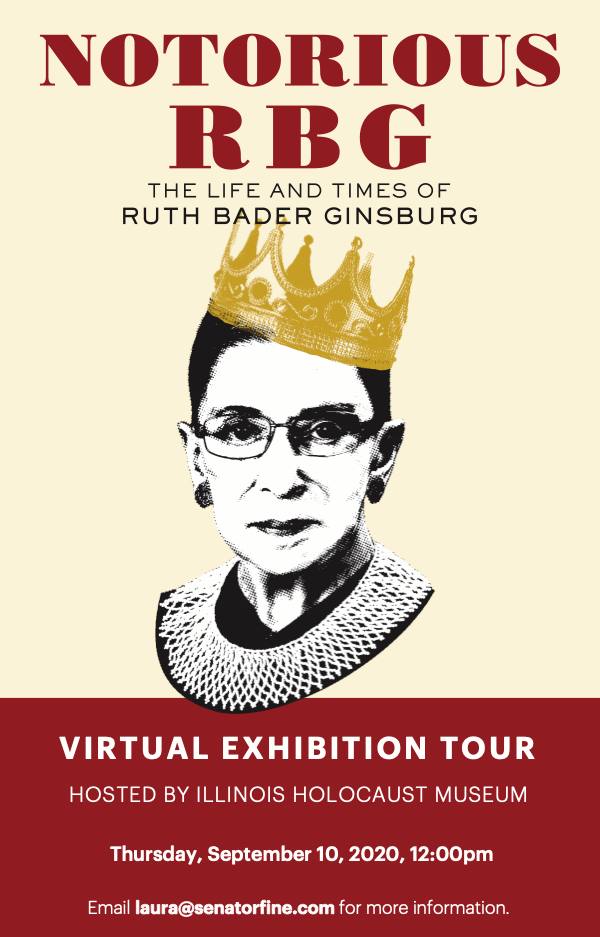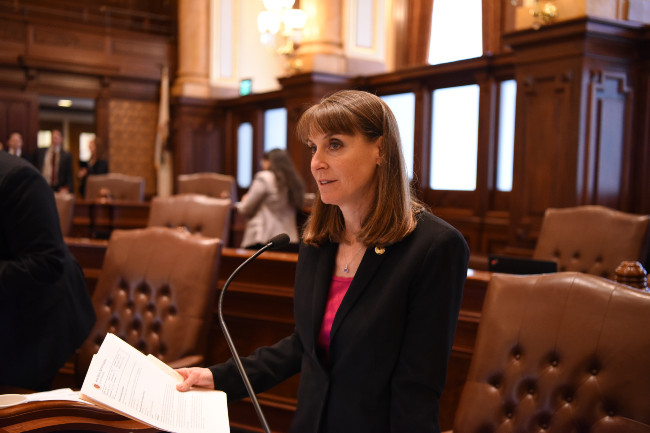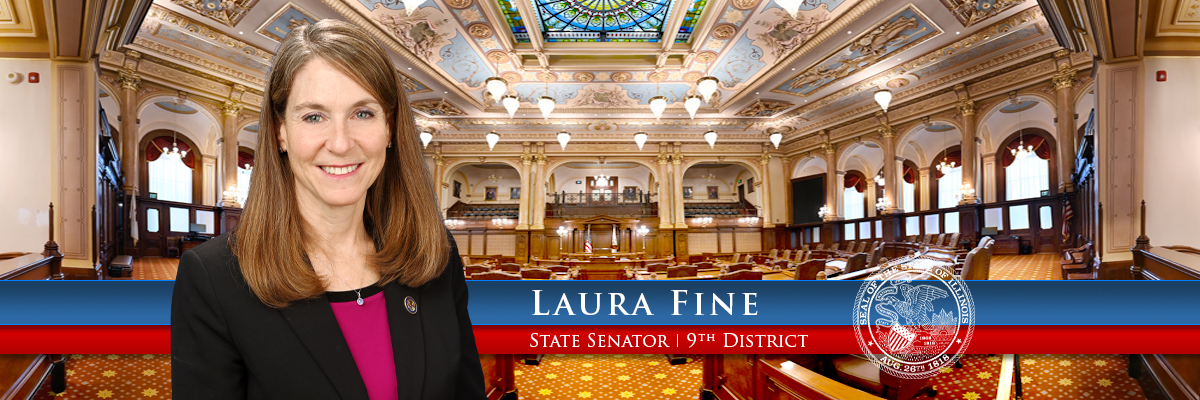- Details
- Category: Press Releases

GLENVIEW – To celebrate the 100th anniversary of the passage of the 19th Amendment and give 9th District residents the opportunity to view the latest special exhibition at the Illinois Holocaust Museum and Education Center, Notorious RBG: The Life and Times of Ruth Bader Ginsburg, State Senator Laura Fine (D-Glenview) is hosting a free virtual tour Thursday, Sept. 10 at noon.
“Even with strict health and safety measures in place, some residents may not feel comfortable visiting a museum in person right now, and the cost of admission can also be a barrier for many families,” said Fine. “I firmly believe everyone should have the chance to view this fascinating exhibition, which is why I partnered with one of my favorite local institutions—the Illinois Holocaust Museum and Education Center in Skokie—to offer this free virtual option.”
On the virtual tour, Chief Curator Arielle Weininger will discuss Supreme Court Justice Ginsburg’s life and work. The tour will include embedded audio, video and photographs of artifacts. After the presentation, Weininger will host a live Q&A.
Fine is hosting the tour in celebration of the 100th anniversary of the passage of the 19th Amendment, establishing women’s constitutional right to vote. Justice Ginsburg, a longtime pioneer for gender equality, cofounded the Women’s Rights Project at the American Civil Liberties Union in 1972 to fight sex discrimination in education and the workplace.
“Justice Ginsburg once said, ‘Women's rights are an essential part of the overall human rights agenda,’” said Fine. “I can think of no better way to celebrate the anniversary of women’s suffrage than to explore her contribution to the women’s movement.”
Notorious RBG: The Life and Times of Ruth Bader Ginsburg is the first-ever museum exhibition exploring Justice Ginsburg’s life through gallery interactives, listening stations, archival photographs and historical artifacts. The exhibition was set to run through Aug. 16, 2020, but has been extended through Jan. 3, 2021.
The tour is free, but registration is required. The deadline to register is Sept. 3. After the deadline has passed, all registrants will receive a link to join the tour via Zoom. For more information, visit SenatorFineIHMECTour.eventbrite.com or contact Fine’s office at 847-998-1717.
- Details
- Category: Press Releases
 GLENVIEW – To support small business owners as they adapt to new health and safety guidelines, State Senator Laura Fine (D-Glenview) announced 56 local businesses will receive a combined $930,000 through the Business Interruption Grant (BIG) program.
GLENVIEW – To support small business owners as they adapt to new health and safety guidelines, State Senator Laura Fine (D-Glenview) announced 56 local businesses will receive a combined $930,000 through the Business Interruption Grant (BIG) program.
“With our state in recovery mode, these grants will give business owners the boost they need to reopen in a way that’s safe for staff and customers,” said Fine. “BIG funding can help get our local economy back on its feet without sacrificing our progress in the fight against COVID-19.”
The Illinois Department of Commerce and Economic Opportunity awarded a total of $46 million to 2,655 small businesses in the first round of BIG funding. The BIG program offers grants to Illinois restaurants and bars, barbershops and salons, and fitness centers that have suffered pandemic-related losses, with a focus on businesses in the hardest-hit areas of the state.
First round grants range from $10,000 to $20,000 and may be used to help businesses with working capital expenses, including payroll costs, rent and utilities. The funds may also be used to cover pandemic-related expenses, such as personal protective equipment, training and new technology.
“This first round of funding is a step toward ensuring a total recovery for our small business community,” said Fine. “I encourage everyone to shop local when possible to help our main streets bounce back from the COVID-19 crisis.”
To ensure ongoing support for small businesses, the State of Illinois has planned future rounds of funding. The BIG program is the largest state-run economic support program formed in response to the COVID-19 economic downturn. The full list of grant recipients is available here.
- Details
- Category: Press Releases
 SPRINGFIELD – To restore the public’s trust in their elected officials in light of recent allegations of corruption within the Illinois government, State Senator Laura Fine (D-Glenview) joined her colleagues in the House and Senate to support a set of measures to overhaul ethics laws in Illinois.
SPRINGFIELD – To restore the public’s trust in their elected officials in light of recent allegations of corruption within the Illinois government, State Senator Laura Fine (D-Glenview) joined her colleagues in the House and Senate to support a set of measures to overhaul ethics laws in Illinois.
The legislative package includes nine proposals to increase transparency in all levels of state government. The lawmakers gathered Thursday to call on the Joint Commission on Ethics and Lobbying Reform to consider recommending the measures in their final report.
“Government officials should be working for their constituents, not themselves,” said Fine. “These steps have the potential to create long-term change to root out corruption and dishonesty in our state government.”
Among the measures Fine is encouraging the Joint Commission to consider:
- Establishing term limits on legislative leadership;
- Enacting a policy to temporarily remove a legislator as a leader and/or committee chair during a criminal investigation or in the event of a charge/indictment;
- Prohibiting legislators from lobbying elected officials from other units of government;
- Establishing at least a one-year prohibition on legislators leaving their offices and working as lobbyists;
- Expanding disclosure of legislators’ outside income; and
- Enabling the Legislative Inspector General to self-initiate investigations and making it an independent agency for the purposes of budgets and hiring.
“I hope all lawmakers—no matter their party—can agree these reforms are crucial to restoring Illinoisans’ confidence in government,” said Fine. “As elected officials, we need to stay vigilant and hold bad actors accountable to prevent corruption.”
The Joint Commission on Ethics and Lobbying Reform is expected to release a report in time for final action.
- Details
- Category: Press Releases

GLENVIEW – To address the widespread shortage of donated blood and potentially help treat patients with severe cases of COVID-19, State Senator Laura Fine (D-Glenview) is hosting a blood drive Thursday, Aug. 27 from noon to 6 p.m. at Glenview Village Hall, located at 2500 E. Lake Avenue.
“Since the pandemic began in March, blood donations have been critically low. With more researchers looking into plasma therapy as a potential COVID-19 treatment, we need more donations from people with antibodies,” said Fine. “Donating blood is always important, but right now it could help us fight this virus.”
All successful blood donations will be tested for COVID-19 antibodies. Researchers hope blood containing antibodies—also known as convalescent plasma—may help treat people with severe COVID-19 by boosting their ability to fight the virus.
The Centers for Disease Control and Prevention estimates about 17.2 million units of blood are used in transfusions every year for accident victims, cancer patients, hemophiliacs, surgery patients and more. In March, the CDC issued a statement encouraging healthy people to donate blood at blood centers that adhere to public health and safety guidelines.
Fine has partnered with Vitalant to host the event. To ensure the safety of all staff and donors, masks will be required.
Appointments are preferred, but walk-ins are welcome. To schedule an appointment to donate, call 877-258-4825 or visit www.Vitalant.org and use the group code 857A.
More Articles …
- Evanston Public Library receives nearly $40K for youth mentorship program
- Senator Fine honors survivors, keeps history alive at reopening of Illinois Holocaust Museum in Skokie
- Senator Fine urges community organizations to apply for grant funding
- Fine invites residents to submit nominations to Senior Illinoisans Hall of Fame
Page 59 of 75







